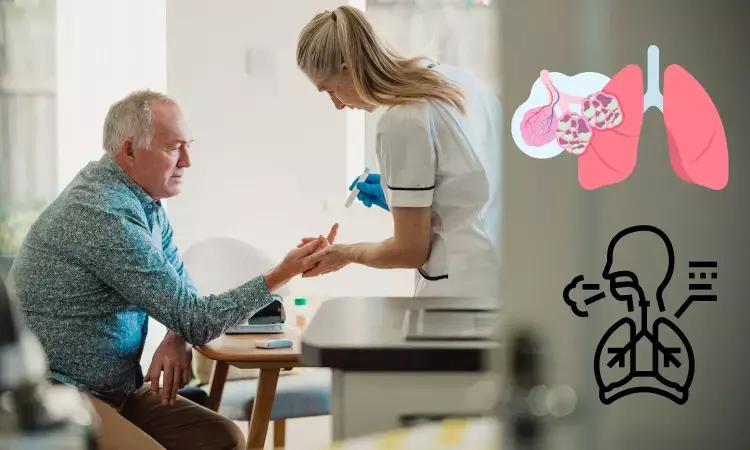- Home
- Medical news & Guidelines
- Anesthesiology
- Cardiology and CTVS
- Critical Care
- Dentistry
- Dermatology
- Diabetes and Endocrinology
- ENT
- Gastroenterology
- Medicine
- Nephrology
- Neurology
- Obstretics-Gynaecology
- Oncology
- Ophthalmology
- Orthopaedics
- Pediatrics-Neonatology
- Psychiatry
- Pulmonology
- Radiology
- Surgery
- Urology
- Laboratory Medicine
- Diet
- Nursing
- Paramedical
- Physiotherapy
- Health news
- Fact Check
- Bone Health Fact Check
- Brain Health Fact Check
- Cancer Related Fact Check
- Child Care Fact Check
- Dental and oral health fact check
- Diabetes and metabolic health fact check
- Diet and Nutrition Fact Check
- Eye and ENT Care Fact Check
- Fitness fact check
- Gut health fact check
- Heart health fact check
- Kidney health fact check
- Medical education fact check
- Men's health fact check
- Respiratory fact check
- Skin and hair care fact check
- Vaccine and Immunization fact check
- Women's health fact check
- AYUSH
- State News
- Andaman and Nicobar Islands
- Andhra Pradesh
- Arunachal Pradesh
- Assam
- Bihar
- Chandigarh
- Chattisgarh
- Dadra and Nagar Haveli
- Daman and Diu
- Delhi
- Goa
- Gujarat
- Haryana
- Himachal Pradesh
- Jammu & Kashmir
- Jharkhand
- Karnataka
- Kerala
- Ladakh
- Lakshadweep
- Madhya Pradesh
- Maharashtra
- Manipur
- Meghalaya
- Mizoram
- Nagaland
- Odisha
- Puducherry
- Punjab
- Rajasthan
- Sikkim
- Tamil Nadu
- Telangana
- Tripura
- Uttar Pradesh
- Uttrakhand
- West Bengal
- Medical Education
- Industry
Elevated Biomarkers Predict Long-Term Mortality Risks in Patients with Suspected Pulmonary Embolism: Study

Finland: Recent research, published in the European Heart Journal Open has highlighted the critical role of several biomarkers-D-dimer, cardiac troponin T, C-reactive protein (CRP), and NT-proBNP-in predicting long-term mortality among patients evaluated for suspected pulmonary embolism (PE). The finding is particularly significant, as it highlights the high mortality risk faced by patients who present with clinical suspicion of PE, even when the diagnosis is ultimately ruled out.
The researchers observed high mortality rates both in patients with and without PE. They suggested that emergency departments give greater attention to these high-risk patients.
Patients with suspected PE often exhibit various symptoms, prompting clinicians to conduct thorough evaluations. However, the study revealed that many of these patients, particularly those who do not ultimately have PE, experience high long-term mortality rates. As such, identifying high-risk individuals early in their clinical journey is crucial.
Pulmonary embolism is a prevalent and potentially life-threatening condition that necessitates immediate diagnostic evaluation. While biomarkers are widely utilized in clinical settings, their role in predicting the long-term prognosis of patients assessed for suspected PE remains largely unclear. Considering this, Juha Kauppi, Turku University Hospital, Emergency Clinic, Turku, Finland, and colleagues sought to evaluate the predictive performance of NT-proBNP, C-reactive protein (CRP), D-dimer (FIDD), and cardiac troponin T (cTnT) in patients who underwent computed tomography pulmonary angiography (CTPA) due to clinical suspicion of PE.
The analysis included 1,001 patients, of whom 222 were diagnosed with pulmonary embolism at the time of imaging. The average age of patients with PE was 65.0 ± 17.1 years, compared to 64.5 ± 17.7 years for those without PE. The median follow-up duration was 3.9 years.
The study led to the following findings:
- Mortality was relatively high both among patients with and without documented PE (24.8% versus 31.7%).
- In patients with PE, only elevated NT-proBNP>1000 ng/L and CRP>50 mg/L levels at hospital admission were associated with higher mortality in an adjusted Cox regression model. Still, ROC analysis showed no improved prediction compared to clinical variables.
- Among patients without PE, elevated NT-proBNP>1000 ng/L, CRP>10 mg/L, cTnT>50 ng/L and FIDD>1.0 mg/L all predicted mortality.
- In a ROC analysis among patients without PE, models including NT-proBNP, cTnT, or CRP provided improved predictive performance.
The findings revealed that patients assessed for clinical suspicion of pulmonary embolism face significant long-term mortality risks. Commonly used biomarkers offer valuable prognostic information for those who do not have PE.
"Considering the relatively young age of many affected individuals, it is crucial to identify high-risk patients, conduct differential diagnoses for other potentially life-threatening conditions, and implement appropriate management strategies," the researchers concluded.
Reference:
Kauppi, J., Airaksinen, K. E., Lehto, J., Pouru, J., Saha, J., Purola, P., Jaakkola, S., Lehtonen, J., Vasankari, T., Juonala, M., & Kiviniemi, T. Performance of D-dimer, cardiac troponin T, C-reactive protein and NT-proBNP in prediction of long-term mortality in patients with suspected pulmonary embolism. European Heart Journal Open. https://doi.org/10.1093/ehjopen/oeae079
Dr Kamal Kant Kohli-MBBS, DTCD- a chest specialist with more than 30 years of practice and a flair for writing clinical articles, Dr Kamal Kant Kohli joined Medical Dialogues as a Chief Editor of Medical News. Besides writing articles, as an editor, he proofreads and verifies all the medical content published on Medical Dialogues including those coming from journals, studies,medical conferences,guidelines etc. Email: drkohli@medicaldialogues.in. Contact no. 011-43720751


